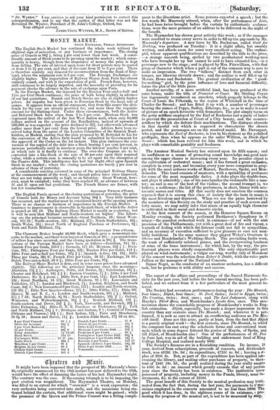ttratrro out( Zugir.
It might have been 'supposed that the prospect of Mr. Macready's benefit, originally announced for the 19th instant but now deferred to the 26th, would have the effect of dimming the lustre of his last Haymarket night. The contrary was the case. If the coming triumph is to be imposing, the past ovation was magnificent. The Haymarket Theatre, on Monday, was filled to an extent for which "crowded" is a weak expression ; the very orchestra being converted into stalls, and the musicians being stationed behind the curtain, that additional room might be gained ; while the presence of the Queen and the Prince Consort was a fitting compli
ment to the illustrious artist. Some persona expected a speech ; bid the few words Mr. Macready uttered, when, after the performance of Icai, he had been twice brought before the curtain by enthusiastic acclamations, were the mere promise of an address to be delivered on the night of the benefit.
The Haymarket has shown great activity this week ; as if the manager were resolved to strain every nerve in order to fill up tne gap made by Mr. Macready's departure. A new farce by Mr. Buckstone, called Good for .NOthing, was produced on Tuesday : it is' a slight affair, but smartly written, and affords room for some very excellent acting. The orphan. girl, whose apparent qualifications are described by the title to the piece, —a strange uncouth being, spoiled by two goodnatured working-men who have brought her up but cannot be said to have educated her,—is a personage new to the stage ; and is played by Mrs. Fitz william, with that grasp of character which when a part is out of the common way is sure to make an impression. The two " fathers," distinct from each other in temper, are likewise cleverly drawn ; and the outline is well filled up by Messrs. Howe and Buckstone. The gradual civilization of the "good, for-nothing" girl, by the joint influence of love and financial difficulty,
.
forms the plot of the little piece.
Another novelty, of a more artificial kind, has been produced at the same house, under the title of Presented at Court. Mr. Stirling Coyne has ingeniously transferred an anecdote, which properly belongs to the Court of Louis the Fifteenth, to the region of Whitehall in the time of Charles the Second ; and has fitted it up with a number of personages bearing the names of Pepys, Smiley, Etherege, &c., so as to make it a sort of picture of an epoch favourite with dramatists. The plot simply turns on the petty artifices employed by the Earl of Rochester and a party of ladies to prevent the presentation at Court of a City beauty, and the counter: artifices by which she defeats their machinations. The dialogue abounds in that careful wit which is supposed to characterize the chosen period, and the personages are on the received model. Mr. Davenport, who represents the Earl of Rochester, is less in his element as the polished profligate, than when he appears as the sailor William, in Black-Eyed Susan ; which has been revived for him this week, and in which he plays with remarkable geniality and freshness.


























 Previous page
Previous page